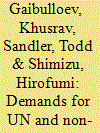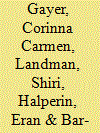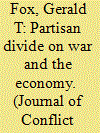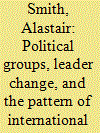|
|
|
Sort Order |
|
|
|
Items / Page
|
|
|
|
|
|
|
| Srl | Item |
| 1 |
ID:
092046


|
|
|
|
|
| Publication |
2009.
|
| Summary/Abstract |
This article presents alternative estimates for the demand for UN and non-UN peacekeeping. Generally, three-way fixed-effects models, which account for the country, year, and conflict region, provide the best estimates. The demand for UN peacekeeping is primarily influenced by the contributions of other nations (i.e., spillins), with spillin elasticity not significantly different from 1. For non-UN peacekeeping, both spillins and country-specific interests in the conflict region influence contributions. These peacekeepers' interests include trade and FDI concerns, along with proximity to the conflict. Peacekeeping missions appear partitioned: UN missions for global public benefits and non-UN missions for peacekeeper-specific benefits.
|
|
|
|
|
|
|
|
|
|
|
|
|
|
|
|
| 2 |
ID:
092049


|
|
|
|
|
| Publication |
2009.
|
| Summary/Abstract |
This article takes a closer look at the relationship between democracy and transnational terrorism. It investigates what it is about democracies that make them particularly vulnerable to terrorism from abroad. The authors suggest that states that exhibit a certain type of foreign policy behavior, regardless of their regime type, are likely to attract transnational terrorism. States that are actively involved in international politics are likely to create resentment abroad and hence more likely to be the target of transnational terrorism than are states that pursue a more isolationist foreign policy. Democratic states are more likely to be targeted by transnational terrorist groups not because of their regime type per se but because of the type of foreign policy they tend to pursue. The empirical analysis provides support for the argument.
|
|
|
|
|
|
|
|
|
|
|
|
|
|
|
|
| 3 |
ID:
092051


|
|
|
|
|
| Publication |
2009.
|
| Summary/Abstract |
In a much-cited recent article, Obermeyer, Murray, and Gakidou (2008a) examine estimates of wartime fatalities from injuries for thirteen countries. Their analysis poses a major challenge to the battle-death estimating methodology widely used by conflict researchers, engages with the controversy over whether war deaths have been increasing or decreasing in recent decades, and takes the debate over different approaches to battle-death estimation to a new level. In making their assessments, the authors compare war death reports extracted from World Health Organization (WHO) sibling survey data with the battle-death estimates for the same countries from the International Peace Research Institute, Oslo (PRIO). The analysis that leads to these conclusions is not compelling, however. Thus, while the authors argue that the PRIO estimates are too low by a factor of three, their comparison fails to compare like with like. Their assertion that there is "no evidence" to support the PRIO finding that war deaths have recently declined also fails. They ignore war-trend data for the periods after 1994 and before 1955, base their time trends on extrapolations from a biased convenience sample of only thirteen countries, and rely on an estimated constant that is statistically insignificant.
|
|
|
|
|
|
|
|
|
|
|
|
|
|
|
|
| 4 |
ID:
092053


|
|
|
|
|
| Publication |
2009.
|
| Summary/Abstract |
One of the most important psychological barriers to conflict resolution is the rigid structure of the sociopsychological repertoire that evolves in societies immersed in intractable conflict. This article examines ways to overcome the rigidity of this repertoire in the context of the Israeli-Palestinian conflict. Specifically, in line with the prospect theory, the authors assumed that elicitation of beliefs about losses stemming from the continuing conflict may bring about a process of "unfreezing." To test this assumption, an exploratory study with a national sample of the Israeli-Jewish population and two subsequent experimental studies were conducted. The results demonstrated that exposure to information about losses inherent in continuing the conflict induces higher willingness to acquire new information about possible solutions to the conflict, higher willingness to reevaluate current positions about it, and more support for compromises than the exposure to neutral information or to information about possible gains derived from the peace agreement.
|
|
|
|
|
|
|
|
|
|
|
|
|
|
|
|
| 5 |
ID:
092050


|
|
|
|
|
| Publication |
2009.
|
| Summary/Abstract |
This study examines the influence of 9/11, the Iraq War, the economy, and the coalition-of-minorities on presidential approval of G. W. Bush across partisan subgroups and aggregate popularity. The analysis considers the effect of underlying partisan preferences on overall approval. A partisan divide occurs for war and the economy on Bush popularity. The events of 9/11 and the Iraq War affect Democratic opinions of Bush more than Republican opinions, whereas the economy impacts Republicans more than Democrats. An in-party/out-party rally effect occurs. Democrats show stronger rallies than Republicans for 9/11 and the Iraq War, but also faster and deeper popularity decay of the rallies. All economic and war-related effects significantly influence Independents and aggregate Bush popularity. The coalition-of-minorities pattern of declining presidential approval is caused by the 9/11 rally decay effect, the war casualties effect, and the slowing economy during Bush's second term in office.
|
|
|
|
|
|
|
|
|
|
|
|
|
|
|
|
| 6 |
ID:
092047


|
|
|
|
|
| Publication |
2009.
|
| Summary/Abstract |
Nations are politically heterogeneous and which group is in political ascendency shapes the nature of interstate cooperation through two mechanisms. First, groups differ in the benefits they receive from cooperation. This affects which groups can commit to cooperate. Second, a nation may selectively withhold cooperation from one group to influence the domestic political competition between groups in another nation. By integrating political competition between leaders of different groups under different institutional rules into a prisoner's dilemma model of international cooperation, the theory generates hypotheses relating leader turnover, group membership, and patterns of cooperation.
|
|
|
|
|
|
|
|
|
|
|
|
|
|
|
|
|
|
|
|
|